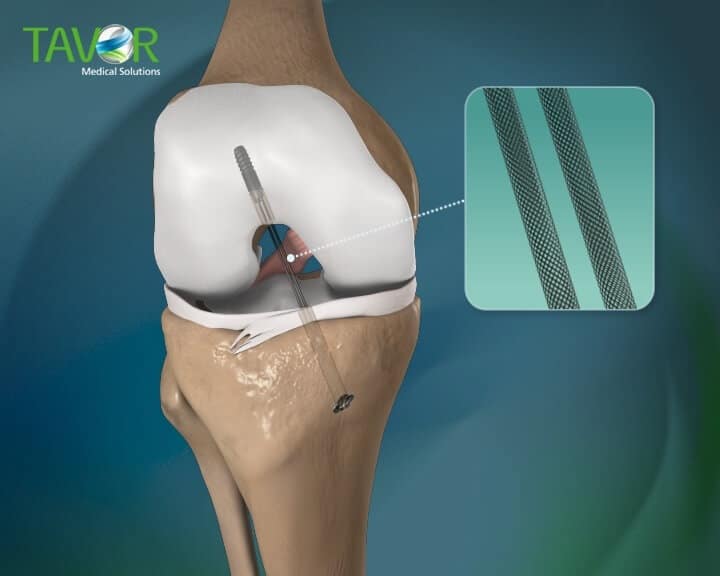These are the winners of the startup competition within the biomed week.

Three companies won as part of the startup competition that took place yesterday and closed ILSI Biomed Week 2012 at the David Intercontinental Hotel.
The competition is taking place for the second year at the Biomed conference and about 30 companies submitted nominations, mainly from the fields of pharma and medical devices. Of these, about ten companies were selected which presented their innovative developments. Both the audience that was in the hall and the six judges who represent the leaders of the industry chose the three winners when the criterion before their eyes was: the three companies that have the potential of success to reach the stage of clinical trials and beyond.
TAVOR company
- Located in Or Yehuda, established in 2008.
- A.T. incubator of the Gefen Investments company.
- The company has developed an artificial knee strap made of a special alloy, nitinol, a super elastic, biocompatible material that allows the body to accept and not reject it. And it has the same mechanical properties as the biological strip.
- The Knee-T-Nol™" artificial ligament has mechanical properties that resemble those of the biological ligament, and is supposed to replace the anterior cruciate ligament in the knee after it has been torn after exertion. The transplantation procedure is the same as the procedure that exists today, but instead of using a ligament from a different place in the body and implanting it in place of the torn ligament, the surgeon implants the artificial ligament. From the interim results of the clinical study, it appears that with its help the patient can return to normal activity 3-4 months later. This is compared to the 6-9 months it would have taken for the patient to come back after the surgery that is taking place today and which included transferring a healthy ligament of the leg to the knee.
- Capital investments: about 2 million dollars in private investment.
- Company founders: Nir and Idan Tobis.
- Developer: Jonathan Yaholom.
- Where the product stands now: The product has passed the pre-clinical trials and human trials have already begun. Now we are waiting for the European CE approval in the process and then the company will work for the American FDA approval.
- The company is currently looking for capital investments of around 5 million dollars.
BIOCEP company
- is inside a greenhouse.
- Established in 2006.
- The company has developed an immunomagnetic technology for the separation of blood cells that is suitable for all types of clinical and medical research. Now the company is taking the development one step further by making it possible to separate fetal cells from the woman's blood circulation at weeks 8-14 of pregnancy in order to allow at the beginning of pregnancy to carry out a full genetic test for the fetus and eliminate the need for amniotic fluid testing.
- Capital investments: 4 million dollars from venture capital fund Point, Capital Company and private investors.
- Scientists: Dr. Ofer Klein and Mr. Aharon Lamish.
- Where does the product stand: The technology will be completed in about a year and a half. Until then, the appropriate approvals will be received and it will be possible to trade it.
- Now looking for additional investors.
- The CEO of the company Hanoch Markscheid: "The whole world is looking for a temptation to test for birth defects at an early stage of pregnancy without endangering the fetus. Today, the early tests are inaccurate, while the late tests endanger the fetus."
HERVANA company
- Established in 2008.
- The company has developed a vaginal preparation as a contraceptive for women based on the Lactobacillus bacterium. The bacterium is naturally found in the reproductive system of the woman and its role is usually to protect the system against infection and infections. It has now been genetically engineered to also act as an anti-sperm agent.
- The preparation is given once a month and is excreted with the menstrual cycle.
- Capital investments: $100 from a Bill and Melinda Gates fund.
- Scientist: Dr. Rachel Teitbaum.
- Vice President of Business Development: Hillel David Zakai.
- Where the product stands: It is currently undergoing pre-clinical trials.
- The company is looking for partners and additional funding.

2 תגובות
Acupuncture is dangerous, does not help anything, and only supports dishonest people. An intelligent person goes to a real doctor.
The Jewish mind invents patents for us. These are the people and these companies that move the Israeli economy forward and guarantee us a better economic future than most countries in the Western world, which is still mostly based on traditional industry or semi-advanced industry. Did we mention the startup nation?